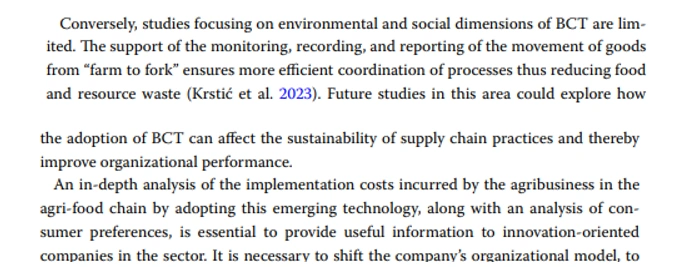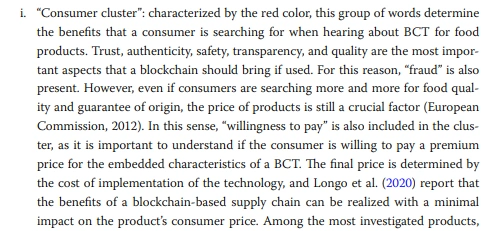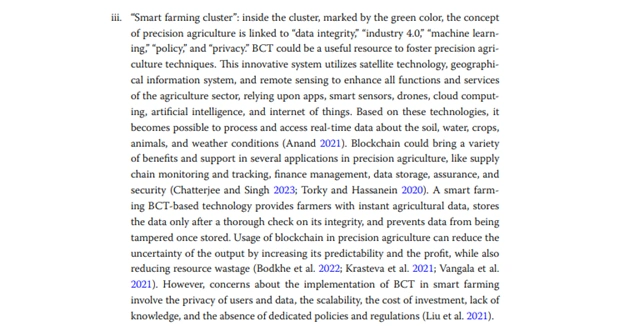Future Research Directions on Blockchain Technology in Agri-Food Supply Chains
Introduction
Blockchain technology integration in the agri-food supply chain is gaining traction due to potential improvements in traceability, transparency, food safety, and fraud prevention. Nonetheless, research on blockchain in agri-food remains scarce, particularly in high-value chains such as wine and olive oil.
This article identifies gaps in the adoption of blockchain in FSCs and suggests potential areas for future research for students and scholars. Each section includes background information, research questions, methodology, and key references to help guide doctoral and postgraduate research, as well as hypotheses.
1. Blockchain Adoption in High-Value Supply Chains: Wine vs. Olive Oil
Background Context
The wine industry has faced more issues with blockchain than the olive oil industry due to problems with counterfeit products, fraudulent labelling, and quality control. Nevertheless, the use of blockchain in olive oil has not been fully understood, even though it is susceptible to fraudulent production, adulteration, and mislabelling [1].

Source: https://agrifoodecon.springeropen.com/counter/pdf/10.1186/s40100-024-00301-1.pdf
Research Questions
- Why is blockchain adoption more common in the wine industry than in the olive oil industry?
- What are the barriers to olive oil producers not implementing blockchain into their supply chain?
- What part does blockchain play in consumer trust and consumer willingness to pay for transparency in both these industries?
Suggested Methodologies
- Qualitative approach: Hold semi-structured interviews with wine and olive oil producers, distributors, and regulatory bodies.
- Quantitative approach: Conduct survey-based research to find out consumer awareness and perception towards blockchain-certified products.
- Comparative analysis: Review current blockchain projects within the wine and olive oil industries to understand what has worked, and what has not.
Potential Hypotheses
H1: The perceived economic benefits of blockchain adoption are higher in the wine industry than in the olive oil industry.
H2: Consumers are willing to pay a price premium for blockchain-certified wine but not necessarily for blockchain-certified olive oil.
Key References
- Blockchain in Wine Industry (Galati et al., 2021; Tiscini et al., 2020)
- Fraud Detection in Olive Oil Supply Chains (Bistarelli et al., 2022)
2. The Environmental and Social Impact of Blockchain in Agri-Food Supply Chains
Background Context
Despite the fact that blockchain enhances product traceability and the overall performance of FSCs, its effects on sustainability and social aspects are not fully understood. Blockchain could be useful for fighting against food waste, improving the effectiveness of supply chain management, and encouraging fair trade – but the current research on these aspects is scarce [1].

Source: https://agrifoodecon.springeropen.com/counter/pdf/10.1186/s40100-024-00301-1.pdf
Research Questions
- How does blockchain enhance sustainability aspects like reducing food waste and energy consumption in FSCs?
- How does improved product traceability with the help of blockchain impact social fairness and equity in developing countries?
- Can blockchain help small farmers to access the market by providing them with a transparent trading platform?
Suggested Methodologies
- Case study approach: Examine the application of blockchain technology in organic and fair-trade food supply chains.
- Big data analysis: Use blockchain transaction data to assess the productivity of the food supply chain and the amount of food waste.
Potential Hypotheses
H1: Use of blockchain can reduce food waste and save resources.
H2: Blockchain-based fair trade certification can enhance the level of trust and participation of smallholder farmers.
Key References
- Blockchain for Sustainability in FSCs (Krstić et al., 2023)
- Fair Trade and Blockchain (Devi et al., 2023)
3. Consumer Perception and Willingness to Pay for Blockchain-Certified Products
Background Context
Customers want to know more about where their food comes from, but studies about blockchain traceability are too low. This research topic aims to contribute to the understanding of consumer preferences, trust, and willingness to pay for blockchain-certified food products [1].

Source: https://agrifoodecon.springeropen.com/counter/pdf/10.1186/s40100-024-00301-1.pdf
Research Questions
Does the consumer trust blockchain certification or traditional food labels?
How does blockchain certification affect purchase decisions for premium agri-food products?
Are customers prepared to pay more for blockchain-certified organic or fair-trade products?
Suggested Methodologies
- Experimental design: To see how different labeling schemes (such as blockchain-certified as opposed to traditional labels) impact consumer behavior and engage in choice-based conjoint analysis.
- Survey analysis: Gather consumer responses at various sociodemographic levels and look at the purchase patterns.
Potential Hypotheses
H1: Consumers are more likely to purchase products with blockchain certification than without it.
H2: The willingness to pay for blockchain-certified food is higher in premium segments (e.g., organic, fair trade, or high-end wine brands).
Key References
- Blockchain and Consumer Trust in Food Labels (Bastian & Zentes, 2013)
- Consumer Attitudes Toward Traceability (Vern et al., 2023)
4. The Integration of Blockchain with Artificial Intelligence in Agri-Food Supply Chains
Background Context
Blockchain on its own is not immune to the problems identified in FSCs. The combination of blockchain with Artificial Intelligence (AI) could boost predictive analytics, automate food safety analysis, and thus increase effectiveness. Nevertheless, the current literature on the use of AI and blockchain in the agri-food value chain is scarce [1].

Source: https://agrifoodecon.springeropen.com/counter/pdf/10.1186/s40100-024-00301-1.pdf
Research Questions
- How can machine learning algorithms improve the traceability of food products through a blockchain network?
- What are the main issues when applying AI to the blockchain in smart FSCs?
- What part does automation play in ensuring food safety through the use of blockchain?
Suggested Methodologies
- Systematic review: Review the current literature on the use of AI and blockchain in food safety and supply chain management.
- Experimental study: Design an AI-rich blockchain model that can help in the identification of likely spoiled food and thus help in the management of inventories.
Potential Hypotheses
H1: The integration of AI with blockchain enhances the accuracy of real-time food quality monitoring.
H2: AI-powered smart contracts can reduce supply chain inefficiencies by automating decision-making processes.
Key References
- Blockchain-AI Convergence in FSCs (Kamble et al., 2020)
- Smart Contracts and AI in Food Safety (Demestichas et al., 2020)
5. Policy and Regulatory Challenges in Blockchain Adoption for Agri-Food
Background Context
The full potential of blockchain in FSCs can only be achieved with the right rules, data management, and norms by the industry. However, there is no clear definition of the concept by policymakers as regards its application in the agri-food sector [1].

Source: https://agrifoodecon.springeropen.com/counter/pdf/10.1186/s40100-024-00301-1.pdf
Research Questions
What are the regulatory barriers to the adoption of blockchain in FSCs?
How can policymakers design uniform blockchain policies to benefit agri-food firms?
What are the privacy and security risks of using blockchain technology in the food traceability system?
Suggested Methodologies
- Comparative policy analysis: Examine regulatory frameworks for blockchain applicable across various countries with regard to the heightened adoption of blockchain.
- Stakeholder interviews: Apply different stakeholder interviews of policymakers, agribusiness leaders, and technology providers.
Potential Hypotheses
H1: Standardized blockchain regulations will accelerate adoption among agribusiness firms.
H2: Regulatory ambiguity is a major deterrent for small and medium-sized enterprises (SMEs) in FSCs adopting blockchain.
Key References
- Blockchain Policy and Food Safety Regulations (Mohapatra et al., 2023)
- Data Privacy Concerns in Blockchain Implementation (Krzyzanowski Guerra & Boys, 2022)
Conclusion
Through the application of Blockchain technology, agri-food supply chains can be improved in terms of traceability, sustainability and efficiency. Still, there are major research gaps especially in high value supply chains, environmental sustainability, integration of AI, consumer behaviour and policy development.
In this regard, the following future research directions can be suggested: To this end, scholars can provide practical insights that may be useful for agribusiness firms, policy makers and consumers as they strive to make sense of the fast-changing world of blockchain adoption in food industry.
Selecting Dissertation Topic from Future Research Directions
Its often the future research directions that offer riveting research topics. They open new areas for investigation which previous studies may have failed to notice.
The amount of contributing potential they hold vary depending on their originality and the aspect they explore.
While research topics decide the fate of your dissertation, a right guidance can make a big difference to your research journey.
PhD Assistance provides you with advanced research support along with academic excellence. From identifying the problem, our research support provides a vast array of services that makes your dissertation stand out.
Visit PhD Assistance’s PhD Topic Selection Services to know more about.

